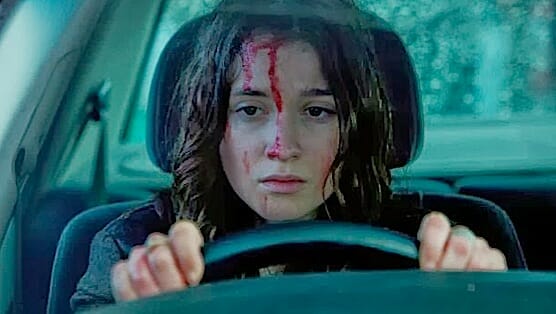In Fear

Sometimes, a horror film needs nothing more than the right cast, the right setting, and an elegantly streamlined story to effectively induce dread. Such is the case with In Fear, the feature debut of Sherlock director Jeremy Lovering; the film completely eschews the trappings of cheap gimmicks and gore, all the better to break the genre down to its fundamentals. Add two parts innocent victims, one part charming psychopath, and one part foreboding backwoods landscape, and you’ve got a perfect, elegantly simple cocktail recipe for scaring the bejeezus out of an unsuspecting viewing audience.
You may chalk this up partly to Lovering’s approach to shooting the bucolic Irish countryside in which In Fear takes place; alternately, you may wish to credit his actors for turning out shockingly natural performances. In truth, the secret to the film’s efficacy lies somewhere in between the impressive efforts of its thespian trio and Lovering’s eye for turning idyll into a labyrinthine nightmare, rife with varying degrees of paranoia. Rather than meddle with forces supernatural, In Fear instead relies heavily on a relentless, unnervingly human brand of cruelty that greatly emphasizes the chemistry of its cast.
The film begins simply enough, kicking things off with a classic comic set-up appended by white-knuckle fear; three people walk into a bar, and eighty minutes of slow-burning terror ensues. Tom (Iain De Caestecker) and Lucy (Alice Englert) are off on holiday to celebrate their two-week anniversary, and they’ve chosen to wander way, way off the beaten path to lodge overnight at a hotel located in remote, pastoral Ireland. It’s all part of Tom’s grand scheme to charm Lucy off her feet, but all his best laid plans are led decidedly astray when they arrive at their destination and find themselves spun about on winding, forested roads, and stalked by an unseen menace lurking in the underbrush.
For a time, Lovering is content allowing In Fear to give the impression of uncertainty. We know something foul is afoot in the maze he’s constructed for his anxious couple, but we don’t quite know what, or even why. At times, we may even side with Tom’s staunch refusal to accept that he and Lucy are in danger of anything other than running out of gas; she, in turn, almost becomes an unreliable narrator, except that we the audience are wise to the grammar of horror and can easily recognize that they aren’t alone on these seemingly unpopulated and terribly uninviting roads. The question simply becomes one of who, or what, is watching them.
-

-

-

-

-

-

-

-

-

-

-

-

-

-

-

-

-

-

-

-

-

-

-

-

-

-

-

-

-

-

-

-

-

-

-

-

-

-

-

-








































